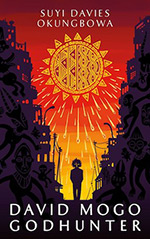
![]() Arifel
Arifel
1/2/2020
![]()
Im grateful that speculative Nigeria seems to be showing up on UK and US bookshelves - and on my personal TBR - more and more often. Not long after my experience with (the very different) The Half-God of Rainfall, Suyi Davies Okungbowa's debut brought me back to the world of Orisha and their dealings with mortals - and those whose identities lie somewhere between the two.
Speaking of things being in-between: Okungbowa's novel actually fits somewhere in the space between being a single story and a set of three interlinked novellas, and while I haven't tracked down its writing history, there's hints - particularly in the opening of the third section - that it was written as the latter before becoming a novel. Normally main characters don't feel the need to reintroduce themselves to the audience at a novel's two-thirds mark, is all I'm saying. It lends itself to an unorthodox tension structure, with three distinct climaxes, but weirdness and very occasional repetition aside, it works well as a single volume, largely due to the driving force of the main character's development, which definitely benefits from being told in a single narrative, regardless of the episodic nature of what happens around it.
That main character, it will not surprise you to hear, is David Mogo, Godhunter. David lives in a version of Lagos which has been subjected to the Falling: a war which has caused thousands of Orisha to rain down on the city and take up residence. A half-god himself, David was abandoned by his mother and raised by a foster-father who also happens to be a wizard, wielding magical talents which David's divinity keeps him from using in the same way. Instead, when we meet David he's trying to throw himself into a bounty hunting existence with as much amoral abandon as possible, taking on a job from far more shady wizard Ajala for "roof money" while trying to suppress the sense that he should be acting with slightly more principle. Tasked with capturing twin gods for Ajala, David's job goes horribly wrong when the second twin, Kehinde lets him in on the realities of what his employer is trying to achieve, and he instead teams up with her, his foster-father and a teenage girl called Fatoumata to try and take him - and the Orisha Aganju, who might just have gotten them all into this mess in the first place - down. Parts two and three of the story skip ahead to deal with the fallout from those first events and to dive deeper into the world's mythological underpinnings while steadily increasing the stakes (and body counts) for each subsequent showdown.
Okungbowa's version of Lagos is positively post-apocalyptic and it feels like there's a lot of horror influence in how most of the city's supernatural creatures behave: a lot of mindless minion-creatures and supernatural experiments which lead to zombie-like offensives with super high body counts and the constant threat of the heroes being overwhelmed. As the threats mount, so David and his allies end up travelling to more parts of this post-apocalyptic Lagos (which, as Okungbowa reminds us through David's narration, wasn't the most functional city to begin with), meeting absentee security forces, other gods both benevolent and antagonistic, and the folks still trying to live their lives in an increasingly unstable situation. Despite being generally well written, however, I sometimes found myself less engaged than I expected in some of the high action scenes, especially if I'd had to put down the book halfway through a "part" and then try and slot back in to the particular set of circumstances being faced. Because the tension structure is more of a "three stories in one" than a single novel, it feels like things can go from zero to one hundred very quickly (unnecessary character reintroductions notwithstanding), and with the goals and alliances regularly changing it can be hard to remember what everyone is trying to achieve at any given moment. No doubt readers who come at this as a "lazy weekend afternoon" book rather than a "half an hour at a time on the commute" book will have a different experience in that regard, but it did inhibit my enjoyment of plot elements I am already somewhat picky about.
http://www.nerds-feather.com/2019/07/microreview-book-david-mogo-godhunter.html